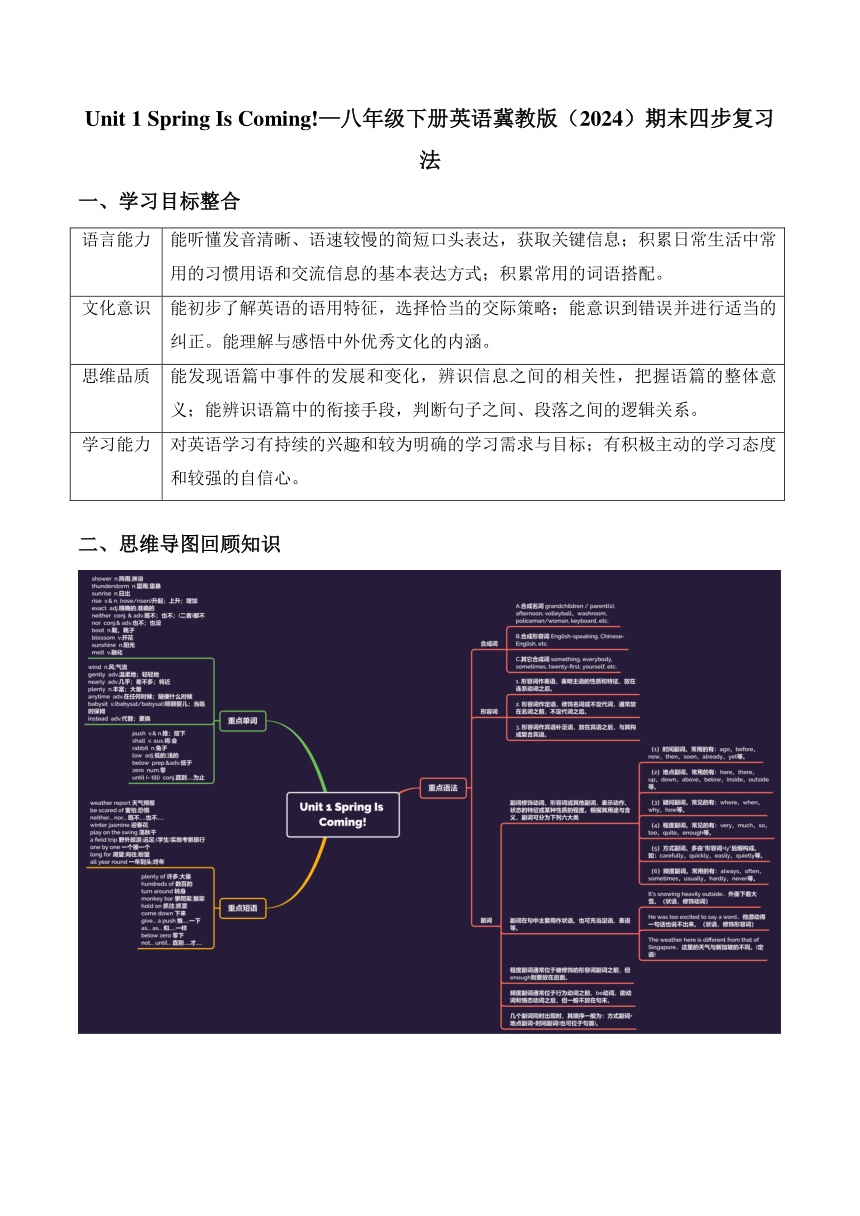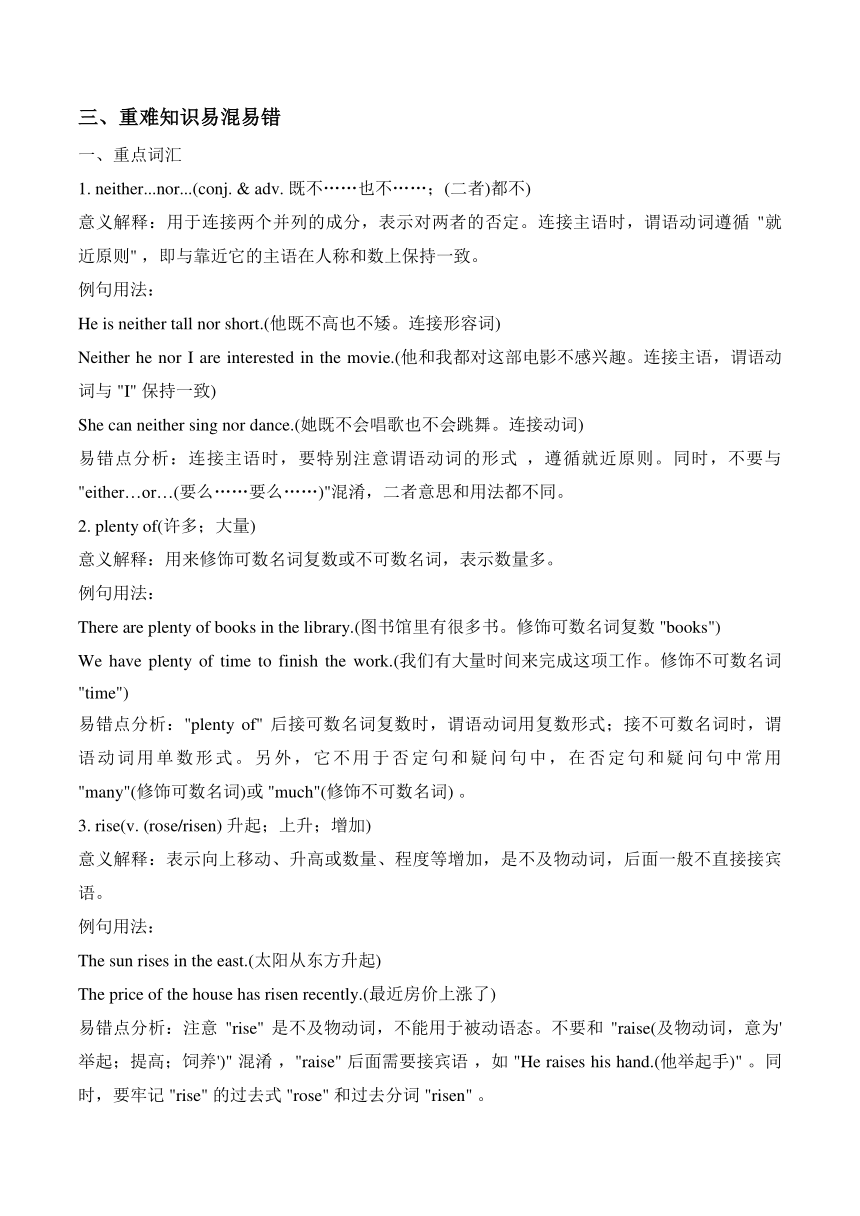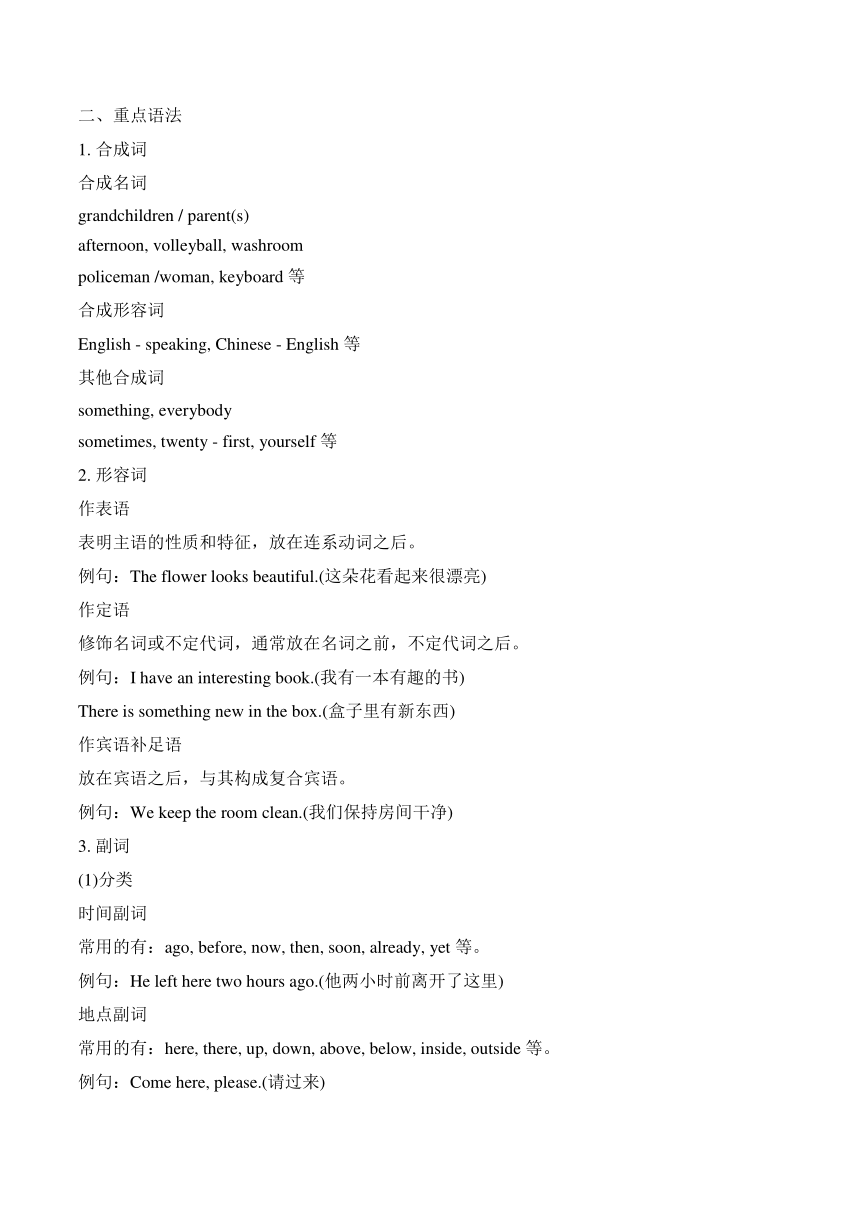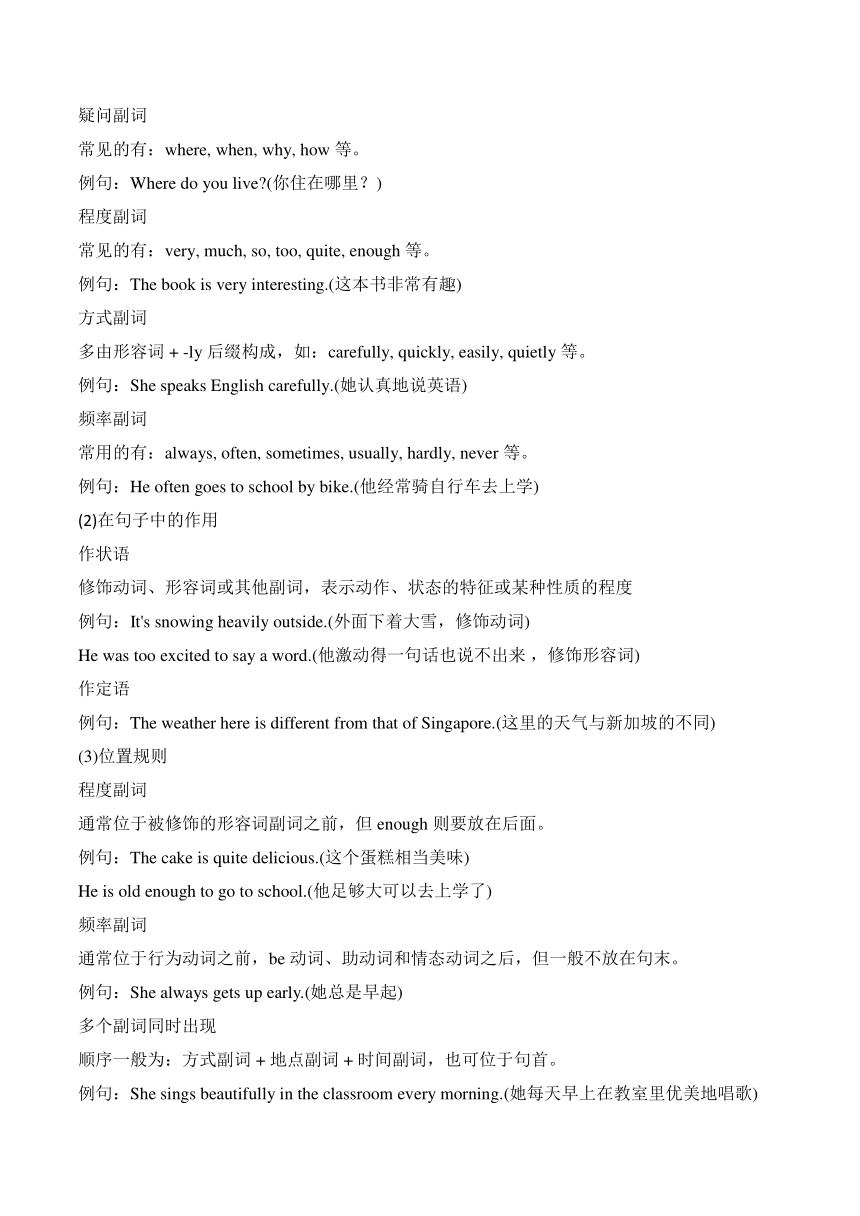Unit 1 Spring Is Coming! 八年级下册英语冀教版(2024)期末四步复习法
文档属性
| 名称 | Unit 1 Spring Is Coming! 八年级下册英语冀教版(2024)期末四步复习法 |  | |
| 格式 | docx | ||
| 文件大小 | 3.0MB | ||
| 资源类型 | 教案 | ||
| 版本资源 | 冀教版 | ||
| 科目 | 英语 | ||
| 更新时间 | 2025-05-29 10:30:01 | ||
图片预览




文档简介
Unit 1 Spring Is Coming!—八年级下册英语冀教版(2024)期末四步复习法
一、学习目标整合
语言能力 能听懂发音清晰、语速较慢的简短口头表达,获取关键信息;积累日常生活中常用的习惯用语和交流信息的基本表达方式;积累常用的词语搭配。
文化意识 能初步了解英语的语用特征,选择恰当的交际策略;能意识到错误并进行适当的纠正。能理解与感悟中外优秀文化的内涵。
思维品质 能发现语篇中事件的发展和变化,辨识信息之间的相关性,把握语篇的整体意义;能辨识语篇中的衔接手段,判断句子之间、段落之间的逻辑关系。
学习能力 对英语学习有持续的兴趣和较为明确的学习需求与目标;有积极主动的学习态度和较强的自信心。
二、思维导图回顾知识
三、重难知识易混易错
一、重点词汇
1. neither...nor...(conj. & adv. 既不……也不……;(二者)都不)
意义解释:用于连接两个并列的成分,表示对两者的否定。连接主语时,谓语动词遵循 "就近原则" ,即与靠近它的主语在人称和数上保持一致。
例句用法:
He is neither tall nor short.(他既不高也不矮。连接形容词)
Neither he nor I are interested in the movie.(他和我都对这部电影不感兴趣。连接主语,谓语动词与 "I" 保持一致)
She can neither sing nor dance.(她既不会唱歌也不会跳舞。连接动词)
易错点分析:连接主语时,要特别注意谓语动词的形式 ,遵循就近原则。同时,不要与 "either…or…(要么……要么……)"混淆,二者意思和用法都不同。
2. plenty of(许多;大量)
意义解释:用来修饰可数名词复数或不可数名词,表示数量多。
例句用法:
There are plenty of books in the library.(图书馆里有很多书。修饰可数名词复数 "books")
We have plenty of time to finish the work.(我们有大量时间来完成这项工作。修饰不可数名词"time")
易错点分析:"plenty of" 后接可数名词复数时,谓语动词用复数形式;接不可数名词时,谓语动词用单数形式。另外,它不用于否定句和疑问句中,在否定句和疑问句中常用 "many"(修饰可数名词)或 "much"(修饰不可数名词) 。
3. rise(v. (rose/risen) 升起;上升;增加)
意义解释:表示向上移动、升高或数量、程度等增加,是不及物动词,后面一般不直接接宾语。
例句用法:
The sun rises in the east.(太阳从东方升起)
The price of the house has risen recently.(最近房价上涨了)
易错点分析:注意 "rise" 是不及物动词,不能用于被动语态。不要和 "raise(及物动词,意为'举起;提高;饲养')" 混淆 ,"raise" 后面需要接宾语 ,如 "He raises his hand.(他举起手)" 。同时,要牢记 "rise" 的过去式 "rose" 和过去分词 "risen" 。
二、重点语法
1. 合成词
合成名词
grandchildren / parent(s)
afternoon, volleyball, washroom
policeman /woman, keyboard 等
合成形容词
English - speaking, Chinese - English 等
其他合成词
something, everybody
sometimes, twenty - first, yourself 等
2. 形容词
作表语
表明主语的性质和特征,放在连系动词之后。
例句:The flower looks beautiful.(这朵花看起来很漂亮)
作定语
修饰名词或不定代词,通常放在名词之前,不定代词之后。
例句:I have an interesting book.(我有一本有趣的书)
There is something new in the box.(盒子里有新东西)
作宾语补足语
放在宾语之后,与其构成复合宾语。
例句:We keep the room clean.(我们保持房间干净)
3. 副词
(1)分类
时间副词
常用的有:ago, before, now, then, soon, already, yet 等。
例句:He left here two hours ago.(他两小时前离开了这里)
地点副词
常用的有:here, there, up, down, above, below, inside, outside 等。
例句:Come here, please.(请过来)
疑问副词
常见的有:where, when, why, how 等。
例句:Where do you live (你住在哪里?)
程度副词
常见的有:very, much, so, too, quite, enough 等。
例句:The book is very interesting.(这本书非常有趣)
方式副词
多由形容词 + -ly 后缀构成,如:carefully, quickly, easily, quietly 等。
例句:She speaks English carefully.(她认真地说英语)
频率副词
常用的有:always, often, sometimes, usually, hardly, never 等。
例句:He often goes to school by bike.(他经常骑自行车去上学)
(2)在句子中的作用
作状语
修饰动词、形容词或其他副词,表示动作、状态的特征或某种性质的程度
例句:It's snowing heavily outside.(外面下着大雪,修饰动词)
He was too excited to say a word.(他激动得一句话也说不出来 ,修饰形容词)
作定语
例句:The weather here is different from that of Singapore.(这里的天气与新加坡的不同)
(3)位置规则
程度副词
通常位于被修饰的形容词副词之前,但 enough 则要放在后面。
例句:The cake is quite delicious.(这个蛋糕相当美味)
He is old enough to go to school.(他足够大可以去上学了)
频率副词
通常位于行为动词之前,be 动词、助动词和情态动词之后,但一般不放在句末。
例句:She always gets up early.(她总是早起)
多个副词同时出现
顺序一般为:方式副词 + 地点副词 + 时间副词,也可位于句首。
例句:She sings beautifully in the classroom every morning.(她每天早上在教室里优美地唱歌)
练习
The sun ____ (升起) in the east every day.
Don't ____ (推) the door so hard.
I waited for him ____ (直到…… 为止) 8 o'clock.
There is ____ (大量) of rain in summer here.
She is ____ (害怕) of dogs.
The temperature will be ____ (低于) zero tomorrow.
Flowers ____ (开花) in spring.
You can come to my house ____ (随便什么时候) you like.
答案
答案:rises
解析:"升起"是"rise",根据"every day"可知句子时态是一般现在时,主语"The sun"是第三人称单数,所以"rise"要用第三人称单数形式"rises"。
答案:push
解析:"推"对应的英文单词是"push","Don't"后接动词原形,构成祈使句的否定形式,所以这里填"push"。
答案:until
解析:"直到……为止"对应的英文单词是"until",所以这里填"until"。
答案:plenty
解析:"大量"对应的英文短语是"plenty of",所以这里填"plenty"。
答案:scared
解析:"害怕"对应的英文表达是"be scared of",所以这里填"scared"。
答案:below
解析:"低于"对应的英文单词是"below",所以这里填"below"。
答案:blossom
解析:"开花"是"blossom",句子描述的是客观事实,用一般现在时,主语"Flowers"是复数,所以"blossom"用原形。
答案:anytime
解析:"随便什么时候"对应的英文单词是"anytime",所以这里填"anytime"。
四、核心素养对接中考
一、阅读理解
After the guests left, the March family sat together around the fire.
Mr. March looked at the four young faces around him with satisfaction (满意).
"It was a difficult year for my little girls, I know," he said to them. "But you were brave." He took Meg's hands in his.
"Meg, your white hands are now rough and red with hard work. They were pretty before but they are prettier to me now. I'm proud of you."
Then he looked at Jo.
"You were my noisy, wild boy!" he said. "But now I can see a good, strong woman with a tender (柔软的) heart in front of me. I'm very happy."
"What about Beth " asked Amy.
"Beth! Dear, good little Beth!" said Mr. March. He looked at her small, thin body and held her tightly.
"We nearly lost her. Now I'm going to keep her safe forever."
Then it was Amy's turn.
"I watched Amy today," Mr. March said. "She is kinder and more helpful than she was. She thinks more about other people and less about herself. I am proud to have a daughter like her. I'm proud of all my wonderful little women!"
(Adapted from Little Women)
1.How many people are mentioned (提及) in the March family according to the passage
A. 3. B. 4. C. 5. D. 6.
2.Who was strong outside but had a tender heart
A. Meg B. Jo C. Amy D. His son
3.We can infer (推断) from the passage that ________.
A. the March family was very poor.
B. Mr. March had a son called Jo.
C. something very bad had happened to Beth.
D. Mr. March lost his job and stayed at home.
4.The passage mainly tells us ________.
A. Mr. March had a big family.
B. the children were different from each other.
C. the March family had a very difficult time for a year.
D. Mr. March praised (表扬) his kids and showed them his love.
二、情景交际
A: Susan, what's your favorite season
B: ①_______ I liked spring before, but now I like winter best.
A: Why do you like winter
B: ②_______ What about you, Bill ③_______
A: My favorite season is summer. I love sunny and warm days.
B: ④_______ It's too hot. The highest temperature can be 40℃ in Chongqing!
A: When summer comes, I like to go swimming in the gym. It can make me cool.
B: That sounds interesting! ⑤______
A: Sure. I think we can enjoy ourselves there.
B: Oh, now I hope summer can come soon!
A. Which season do you like best
B. I like fall best.
C. Well, it's hard to say.
D. Can I go with you next summer
E. What's the weather like in spring
F. Because it's a good time to make snowmen.
G. Oh, I don't like summer at all.
答案
一、阅读理解
1.答案:C
解析:March 一家一共五口人,分别是爸爸 Mr. March 和他的四个女儿 Meg, Jo, Beth, Amy。
2.答案:B
解析:根据文章内容 "You were my noisy, wild boy! ...But now I can see a good, strong woman with a tender heart in front of me." 可知,Jo 外表看似 noisy, wild,但内心柔软。
3.答案:C
解析:根据文章内容 "We nearly lost her. Now I'm going to keep her safe forever." 可知,Beth 之前可能生过重病,差点失去生命。
4.答案:D
解析:文章中Mr. March分别评价了四个女儿Meg, Jo, Beth和Amy,并表达了对她们的爱和自豪。
二、情景交际
答案:①-⑤ CFAGD
解析:这个对话是AB两人在谈论彼此喜欢的季节及原因。
①根据上文"Susan, what's your favorite season "及下文"I liked spring before, but now I like winter best."回答可知,此处应是表示对这个问题不好回答,选项C"哦,很难说。"符合语境,故选C。
②根据上文"Why do you like winter "可知,空处应该是回答喜欢冬天的原因。选项F"因为现在是堆雪人的好时候。"符合语境,故选F。
③根据下文"My favorite season is summer. I love sunny and warm days."可知,空处是问对方最喜欢哪个季节,选项A"你最喜欢哪个季节?"符合语境,故选A。
④根据下文"It's too hot. The highest temperature can be 40℃ in Chongqing!"可知,空处是不喜欢夏天,选项G"哦,我一点也不喜欢夏天。"符合语境,故选G。
⑤根据下文"Sure. I think we can enjoy ourselves there."可知,空处是表示希望一起去游泳,选项D"明年夏天我能和你一起去吗?"符合语境,故选D。
一、学习目标整合
语言能力 能听懂发音清晰、语速较慢的简短口头表达,获取关键信息;积累日常生活中常用的习惯用语和交流信息的基本表达方式;积累常用的词语搭配。
文化意识 能初步了解英语的语用特征,选择恰当的交际策略;能意识到错误并进行适当的纠正。能理解与感悟中外优秀文化的内涵。
思维品质 能发现语篇中事件的发展和变化,辨识信息之间的相关性,把握语篇的整体意义;能辨识语篇中的衔接手段,判断句子之间、段落之间的逻辑关系。
学习能力 对英语学习有持续的兴趣和较为明确的学习需求与目标;有积极主动的学习态度和较强的自信心。
二、思维导图回顾知识
三、重难知识易混易错
一、重点词汇
1. neither...nor...(conj. & adv. 既不……也不……;(二者)都不)
意义解释:用于连接两个并列的成分,表示对两者的否定。连接主语时,谓语动词遵循 "就近原则" ,即与靠近它的主语在人称和数上保持一致。
例句用法:
He is neither tall nor short.(他既不高也不矮。连接形容词)
Neither he nor I are interested in the movie.(他和我都对这部电影不感兴趣。连接主语,谓语动词与 "I" 保持一致)
She can neither sing nor dance.(她既不会唱歌也不会跳舞。连接动词)
易错点分析:连接主语时,要特别注意谓语动词的形式 ,遵循就近原则。同时,不要与 "either…or…(要么……要么……)"混淆,二者意思和用法都不同。
2. plenty of(许多;大量)
意义解释:用来修饰可数名词复数或不可数名词,表示数量多。
例句用法:
There are plenty of books in the library.(图书馆里有很多书。修饰可数名词复数 "books")
We have plenty of time to finish the work.(我们有大量时间来完成这项工作。修饰不可数名词"time")
易错点分析:"plenty of" 后接可数名词复数时,谓语动词用复数形式;接不可数名词时,谓语动词用单数形式。另外,它不用于否定句和疑问句中,在否定句和疑问句中常用 "many"(修饰可数名词)或 "much"(修饰不可数名词) 。
3. rise(v. (rose/risen) 升起;上升;增加)
意义解释:表示向上移动、升高或数量、程度等增加,是不及物动词,后面一般不直接接宾语。
例句用法:
The sun rises in the east.(太阳从东方升起)
The price of the house has risen recently.(最近房价上涨了)
易错点分析:注意 "rise" 是不及物动词,不能用于被动语态。不要和 "raise(及物动词,意为'举起;提高;饲养')" 混淆 ,"raise" 后面需要接宾语 ,如 "He raises his hand.(他举起手)" 。同时,要牢记 "rise" 的过去式 "rose" 和过去分词 "risen" 。
二、重点语法
1. 合成词
合成名词
grandchildren / parent(s)
afternoon, volleyball, washroom
policeman /woman, keyboard 等
合成形容词
English - speaking, Chinese - English 等
其他合成词
something, everybody
sometimes, twenty - first, yourself 等
2. 形容词
作表语
表明主语的性质和特征,放在连系动词之后。
例句:The flower looks beautiful.(这朵花看起来很漂亮)
作定语
修饰名词或不定代词,通常放在名词之前,不定代词之后。
例句:I have an interesting book.(我有一本有趣的书)
There is something new in the box.(盒子里有新东西)
作宾语补足语
放在宾语之后,与其构成复合宾语。
例句:We keep the room clean.(我们保持房间干净)
3. 副词
(1)分类
时间副词
常用的有:ago, before, now, then, soon, already, yet 等。
例句:He left here two hours ago.(他两小时前离开了这里)
地点副词
常用的有:here, there, up, down, above, below, inside, outside 等。
例句:Come here, please.(请过来)
疑问副词
常见的有:where, when, why, how 等。
例句:Where do you live (你住在哪里?)
程度副词
常见的有:very, much, so, too, quite, enough 等。
例句:The book is very interesting.(这本书非常有趣)
方式副词
多由形容词 + -ly 后缀构成,如:carefully, quickly, easily, quietly 等。
例句:She speaks English carefully.(她认真地说英语)
频率副词
常用的有:always, often, sometimes, usually, hardly, never 等。
例句:He often goes to school by bike.(他经常骑自行车去上学)
(2)在句子中的作用
作状语
修饰动词、形容词或其他副词,表示动作、状态的特征或某种性质的程度
例句:It's snowing heavily outside.(外面下着大雪,修饰动词)
He was too excited to say a word.(他激动得一句话也说不出来 ,修饰形容词)
作定语
例句:The weather here is different from that of Singapore.(这里的天气与新加坡的不同)
(3)位置规则
程度副词
通常位于被修饰的形容词副词之前,但 enough 则要放在后面。
例句:The cake is quite delicious.(这个蛋糕相当美味)
He is old enough to go to school.(他足够大可以去上学了)
频率副词
通常位于行为动词之前,be 动词、助动词和情态动词之后,但一般不放在句末。
例句:She always gets up early.(她总是早起)
多个副词同时出现
顺序一般为:方式副词 + 地点副词 + 时间副词,也可位于句首。
例句:She sings beautifully in the classroom every morning.(她每天早上在教室里优美地唱歌)
练习
The sun ____ (升起) in the east every day.
Don't ____ (推) the door so hard.
I waited for him ____ (直到…… 为止) 8 o'clock.
There is ____ (大量) of rain in summer here.
She is ____ (害怕) of dogs.
The temperature will be ____ (低于) zero tomorrow.
Flowers ____ (开花) in spring.
You can come to my house ____ (随便什么时候) you like.
答案
答案:rises
解析:"升起"是"rise",根据"every day"可知句子时态是一般现在时,主语"The sun"是第三人称单数,所以"rise"要用第三人称单数形式"rises"。
答案:push
解析:"推"对应的英文单词是"push","Don't"后接动词原形,构成祈使句的否定形式,所以这里填"push"。
答案:until
解析:"直到……为止"对应的英文单词是"until",所以这里填"until"。
答案:plenty
解析:"大量"对应的英文短语是"plenty of",所以这里填"plenty"。
答案:scared
解析:"害怕"对应的英文表达是"be scared of",所以这里填"scared"。
答案:below
解析:"低于"对应的英文单词是"below",所以这里填"below"。
答案:blossom
解析:"开花"是"blossom",句子描述的是客观事实,用一般现在时,主语"Flowers"是复数,所以"blossom"用原形。
答案:anytime
解析:"随便什么时候"对应的英文单词是"anytime",所以这里填"anytime"。
四、核心素养对接中考
一、阅读理解
After the guests left, the March family sat together around the fire.
Mr. March looked at the four young faces around him with satisfaction (满意).
"It was a difficult year for my little girls, I know," he said to them. "But you were brave." He took Meg's hands in his.
"Meg, your white hands are now rough and red with hard work. They were pretty before but they are prettier to me now. I'm proud of you."
Then he looked at Jo.
"You were my noisy, wild boy!" he said. "But now I can see a good, strong woman with a tender (柔软的) heart in front of me. I'm very happy."
"What about Beth " asked Amy.
"Beth! Dear, good little Beth!" said Mr. March. He looked at her small, thin body and held her tightly.
"We nearly lost her. Now I'm going to keep her safe forever."
Then it was Amy's turn.
"I watched Amy today," Mr. March said. "She is kinder and more helpful than she was. She thinks more about other people and less about herself. I am proud to have a daughter like her. I'm proud of all my wonderful little women!"
(Adapted from Little Women)
1.How many people are mentioned (提及) in the March family according to the passage
A. 3. B. 4. C. 5. D. 6.
2.Who was strong outside but had a tender heart
A. Meg B. Jo C. Amy D. His son
3.We can infer (推断) from the passage that ________.
A. the March family was very poor.
B. Mr. March had a son called Jo.
C. something very bad had happened to Beth.
D. Mr. March lost his job and stayed at home.
4.The passage mainly tells us ________.
A. Mr. March had a big family.
B. the children were different from each other.
C. the March family had a very difficult time for a year.
D. Mr. March praised (表扬) his kids and showed them his love.
二、情景交际
A: Susan, what's your favorite season
B: ①_______ I liked spring before, but now I like winter best.
A: Why do you like winter
B: ②_______ What about you, Bill ③_______
A: My favorite season is summer. I love sunny and warm days.
B: ④_______ It's too hot. The highest temperature can be 40℃ in Chongqing!
A: When summer comes, I like to go swimming in the gym. It can make me cool.
B: That sounds interesting! ⑤______
A: Sure. I think we can enjoy ourselves there.
B: Oh, now I hope summer can come soon!
A. Which season do you like best
B. I like fall best.
C. Well, it's hard to say.
D. Can I go with you next summer
E. What's the weather like in spring
F. Because it's a good time to make snowmen.
G. Oh, I don't like summer at all.
答案
一、阅读理解
1.答案:C
解析:March 一家一共五口人,分别是爸爸 Mr. March 和他的四个女儿 Meg, Jo, Beth, Amy。
2.答案:B
解析:根据文章内容 "You were my noisy, wild boy! ...But now I can see a good, strong woman with a tender heart in front of me." 可知,Jo 外表看似 noisy, wild,但内心柔软。
3.答案:C
解析:根据文章内容 "We nearly lost her. Now I'm going to keep her safe forever." 可知,Beth 之前可能生过重病,差点失去生命。
4.答案:D
解析:文章中Mr. March分别评价了四个女儿Meg, Jo, Beth和Amy,并表达了对她们的爱和自豪。
二、情景交际
答案:①-⑤ CFAGD
解析:这个对话是AB两人在谈论彼此喜欢的季节及原因。
①根据上文"Susan, what's your favorite season "及下文"I liked spring before, but now I like winter best."回答可知,此处应是表示对这个问题不好回答,选项C"哦,很难说。"符合语境,故选C。
②根据上文"Why do you like winter "可知,空处应该是回答喜欢冬天的原因。选项F"因为现在是堆雪人的好时候。"符合语境,故选F。
③根据下文"My favorite season is summer. I love sunny and warm days."可知,空处是问对方最喜欢哪个季节,选项A"你最喜欢哪个季节?"符合语境,故选A。
④根据下文"It's too hot. The highest temperature can be 40℃ in Chongqing!"可知,空处是不喜欢夏天,选项G"哦,我一点也不喜欢夏天。"符合语境,故选G。
⑤根据下文"Sure. I think we can enjoy ourselves there."可知,空处是表示希望一起去游泳,选项D"明年夏天我能和你一起去吗?"符合语境,故选D。
同课章节目录
- Unit 1 Spring Is Coming
- Lesson 1 How's the weather?
- Lesson 2 It's Getting Warmer!
- Lesson 3 Sun Is Rising
- Lesson 4 The Spring City
- Lesson 5 Babysitting on a Spring Day
- Lesson 6 Stories about Spring
- Unit 2 Plant a Plant
- Lesson 7 Planting Trees
- Lesson 8 Why Are Plants Important?
- Lesson 9 Gardening with Mary
- Lesson 10 Make Your Garden Grow!
- Lesson 11 Amazing Plants
- Lesson 12 Danny's Plant
- Unit 3 Animals Are Our Friends
- Lesson 13 Danny's Big Scare
- Lesson 14 Amazing Animals
- Lesson 15 The Zoo Is Open
- Lesson 16 The Pear Escaped
- Lesson 17 Save the Tigers
- Lesson 18 Friendship Between Animals
- Unit 4 The Internet Connects Us
- Lesson 19 How Do You Use the Internet?
- Lesson 20 A Computer Helps!
- Lesson 21 Books or Computers?
- Lesson 22 Travel on the Internet
- Lesson 23 The Internet--Good or Bad?
- Lesson 24 An E-mail to Grandpa
- Unit 5 Buying and Selling
- Lesson 25 Raising Money
- Lesson 26 Cookies, Please!
- Lesson 27 Business English
- Lesson 28 Ms. Liu's Great Idea
- Lesson 29 How to Push a Product
- Lesson 30 A Cookie Sale
- Unit 6 Be a Champion!
- Lesson 31 Don't Fall, Danny
- Lesson 32 My Favourite Record
- Lesson 33 2800 Years of Sports
- Lesson 34 Modern Olympics
- Lesson 35 The Dream Team
- Lesson 36 Classroom Olympics
- Unit 7 Know Our World
- Lesson 37 Let's Learn Geography!
- Lesson 38 The World Is a Big Place
- Lesson 39 Ring Up or Call?
- Lesson 40 Body Language
- Lesson 41 A Class of the World
- Lesson 42 North America
- Unit 8 Save Our World
- Lesson 43 Let's Clean Up!
- Lesson 44 Environment Clubs
- Lesson 45 Let's Sort Garbage!
- Lesson 46 Protect Our Environment
- Lesson 47 Connected to Nature
- Lesson 48 Garbage Is Interesting!
